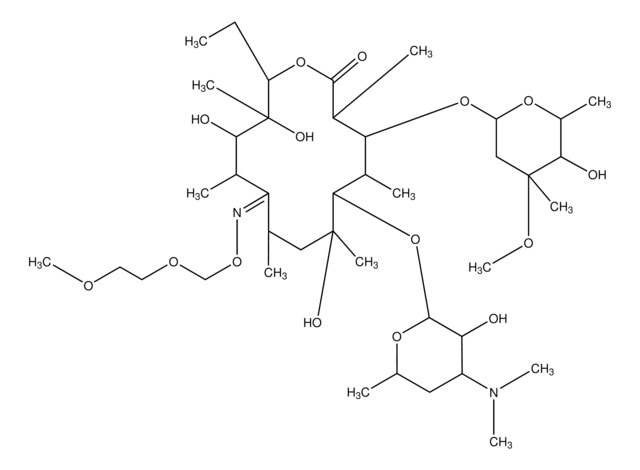A8861
Aceclofenac
≥98% (HPLC)
Synonym(s):
2-[(2,6-Dichlorophenyl)amino]benzeneacetic acid carboxymethyl ester;
About This Item
Recommended Products
Assay
≥98% (HPLC)
form
powder
color
off-white to light tan
solubility
DMSO: ≥20 mg/mL
storage temp.
room temp
SMILES string
OC(=O)COC(=O)Cc1ccccc1Nc2c(Cl)cccc2Cl
InChI
1S/C16H13Cl2NO4/c17-11-5-3-6-12(18)16(11)19-13-7-2-1-4-10(13)8-15(22)23-9-14(20)21/h1-7,19H,8-9H2,(H,20,21)
InChI key
MNIPYSSQXLZQLJ-UHFFFAOYSA-N
Gene Information
human ... PTGS2(5743)
Looking for similar products? Visit Product Comparison Guide
Application
Biochem/physiol Actions
Signal Word
Danger
Hazard Statements
Precautionary Statements
Hazard Classifications
Acute Tox. 3 Oral - Aquatic Acute 1 - Aquatic Chronic 1 - Eye Irrit. 2
Storage Class Code
6.1C - Combustible acute toxic Cat.3 / toxic compounds or compounds which causing chronic effects
WGK
WGK 3
Flash Point(F)
Not applicable
Flash Point(C)
Not applicable
Certificates of Analysis (COA)
Search for Certificates of Analysis (COA) by entering the products Lot/Batch Number. Lot and Batch Numbers can be found on a product’s label following the words ‘Lot’ or ‘Batch’.
Already Own This Product?
Find documentation for the products that you have recently purchased in the Document Library.
Customers Also Viewed
Our team of scientists has experience in all areas of research including Life Science, Material Science, Chemical Synthesis, Chromatography, Analytical and many others.
Contact Technical Service







